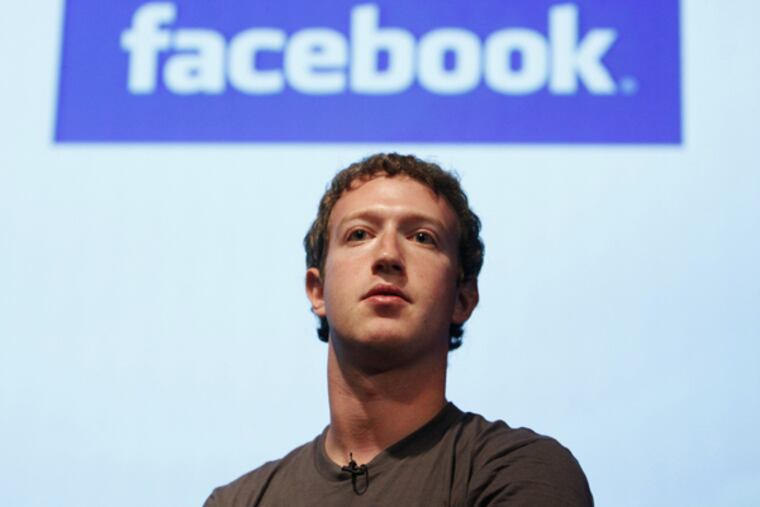Growing pains for Facebook
Facebook turned 10 in February, and like any 10-year-old, it's changing, complete with growing pains and headaches. With 1.28 billion users of the world's most popular social medium, Facebook is trying to keep users, attract more users, make money, and please advertisers, all at the same time. But those goals - have you noticed? - conflict.

Facebook turned 10 in February, and like any 10-year-old, it's changing, complete with growing pains and headaches.
With 1.28 billion users of the world's most popular social medium, Facebook is trying to keep users, attract more users, make money, and please advertisers, all at the same time. But those goals - have you noticed? - conflict.
The Facebook F8 conference Wednesday in San Francisco highlighted the delights and challenges to come. Cofounder Mark Zuckerberg - who, amazingly, turns 30 on May 14 - spoke of "a culture of loving the people we serve." But is that users or advertisers? Or both?
The main conflict in point: Facebook is trying to improve your sense of privacy while helping advertisers track and target you, based on information you give to Facebook. So you can be more private - even as your personal info is used to sell you stuff.
Privacy: Up to now, if you're intrigued by a Facebook-based app named, say, Angry Flowers or Hilarious Cat Farm, when you register, you must let the app get at all the info you gave when you first registered with Facebook. But Wednesday, Facebook announced Anonymous Log-in, which lets you try apps without telling who you are or sharing your info. The Facebook log-in itself will change, too, to give you sort of a line-item veto on the info automatically shared with apps.
Privacy control! Could this be a response to the unease over privacy - this from the guy who told us in 2010 that privacy was no longer a "social norm"?
But user privacy is, and ever will be, in tension with the need to monetize. User info is what Facebook has to sell - and there's money in making it mobile. People with handhelds are on the go, clicking their apps, those little bookmarks and enablers, weaving webs of their own. They leave a trail of choices and locations that's catnip for app-makers and advertisers. Apps are the axons in the great nervous system of the mobile Web, and Facebook's going that way, too, especially in the last two years. It's money.
For a while now, Zuckerberg has been calling Facebook "the big blue app" - a bundle of apps, really. He wants to spin off some - but even more, he wants other apps to come live on or connect to Facebook. Last year, people logged into apps and websites using their Facebook log-in creds more than 10 billion times. In April 2013, Facebook bought the app-making tool kit Parse, and since then, 260,000 apps have been built with it. Facebook wants to help people make apps, and money: Zuckerberg said, "We're going to help you monetize in a serious way on mobile."
Fully 59 percent of Facebook's revenue is from mobile advertising. Facebook claims 1.01 billion monthly active mobile users. At F8, it boasted that it had "one million advertisers," and that its payments system has processed $3 billion in transactions for app developers, with 100 of them making $1 million-plus a year via Facebook.
Ads: Also unveiled Wednesday was Facebook Audience Network (FAN). Until now, advertisers on Facebook had access to all Facebook's info about you, your background, every "like," every click, every friend and un-, every site you signed into via Facebook log-ins. And they could use that to target ads to you - but only on Facebook. FAN, though, is a network of apps that extends outside Facebook itself. App-makers, if they join FAN, can use Facebook info to track user preferences and target ads (outside Facebook) to them, on other apps, other sites. If FAN is widely adopted, it could extend Facebook throughout the Web.
Nefarious? Creepy? Depends on how you feel about e-commerce. Every move you make, every breath you take, somebot someplace is watching you. Were I so inclined, I could be anywhere from irritated to torqued off at bots tracking me to sell me stuff.
But it's here, it isn't going away, and Facebook says it works. In its first-quarter earnings report, it said it made $2.27 billion in ad revenue. Wall Street seems to agree: Since Facebook went public in May 2012, one share of the company has gone from $38 to about $60. Ad revenues for 2013 were $6.99 billion.
You'll have somewhat more control over your info - but far from total. It'll still be used - and now, used much more, much more widely - to sell you, sell you, sell you.
Facebook walks a similar cliff-edge in other ways. Its old motto, largely a relic now, is: "It's free and always will be." Yes, if you want to sign up for Facebook, there's no charge. And you can start friending, unfriending, liking, and so on, and it doesn't cost a cent.
But it's undeniable: As it leaves childhood, Facebook, moving to monetize, has sliced and diced your reach, the size of your audience, the number of people who see your posts. You, and advertisers, must pay to reach more eyeballs. Space and reach, once free, never will be again.
There have been complaints - and perhaps would be more, but it's hard to complain when you don't understand what's going on. And a lot of people don't.
The question is: How long can "the big blue app" balance pleasing users and pleasing advertisers? Is there a peril-point at which one wrong bot-move could blow up the joint? If you love "the people we serve" too much, will the other people you serve scram?
Welcome, Facebook, to your next 10 years.
215-854-4406 @jtimpane